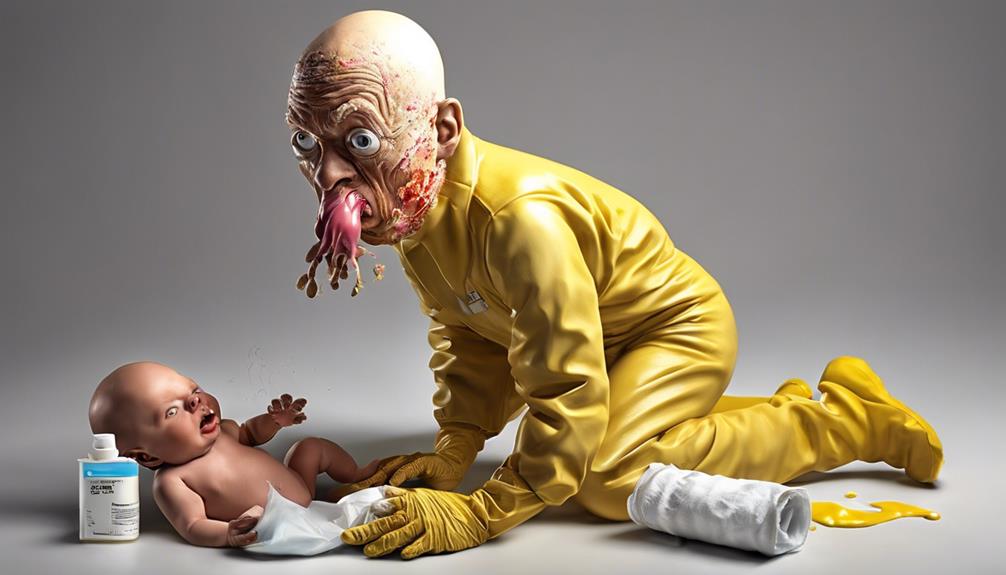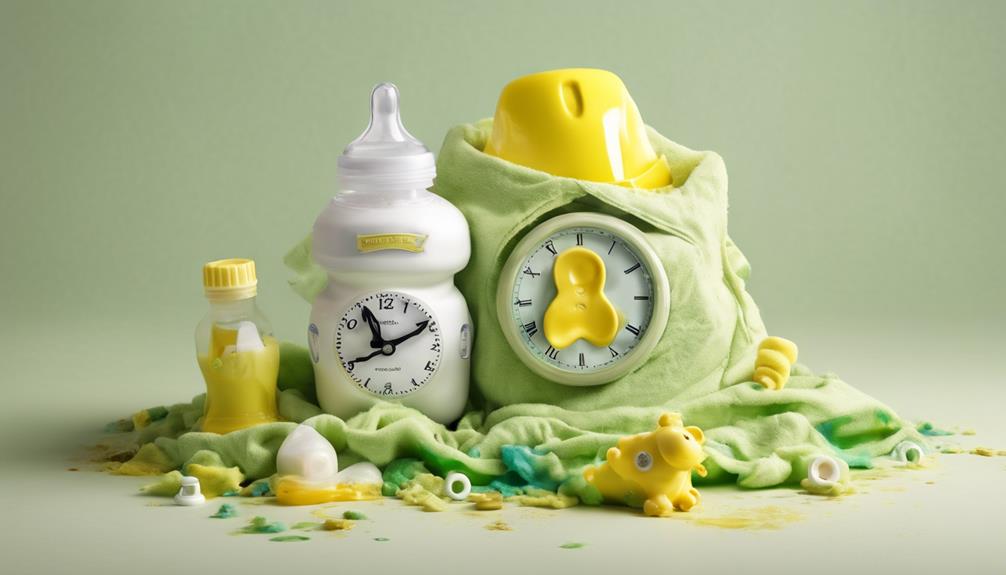As we navigate the murky waters of newborn care, encountering poop that reeks of rotten eggs can certainly throw us for a loop. The stench can be quite alarming, leaving us wondering about its underlying causes and how best to address them.
But fear not, for there are practical steps we can take to tackle this pungent issue head-on. Let's explore effective strategies for handling newborn poop that emits a foul odor reminiscent of rotten eggs and make sure our little ones stay healthy and comfortable.
Key Takeaways
- Sulfur compounds in the digestive tract contribute to foul odor.
- Adjusting maternal diet can impact breastfed baby poop smell.
- Consulting healthcare providers for tailored guidance is crucial.
- Introducing probiotics can reduce smelly newborn poop odor.

Culturelle Baby Digestive Calm & Comfort Probiotic (Age 0-12 Mos) 8.5Ml, Helps Periodic Colic, Gas, Fussiness, Crying & Digestive Upset In Infants & Newborns, Vegan Non-Gmo Gluten-Free, 1 Mos. Supply
FROM THE #1 PEDIATRICIAN RECOMMENDED PROBIOTIC BRAND⟐: Build a strong foundation for infants with Culturelle Baby Digestive Calm…
As an affiliate, we earn on qualifying purchases.
As an affiliate, we earn on qualifying purchases.
Understanding the Causes
Examining the reasons behind the foul odor resembling rotten eggs in a newborn's stool is essential in determining the root cause of this issue. The digestive system of a newborn plays an important role in the production of this distinct smell. Sulfur compounds present in the digestive tract can lead to this unpleasant odor.
In the case of breastfed babies, the smell may indicate difficulty digesting lactose or milk proteins present in breast milk. On the other hand, formula-fed babies might experience this odor due to specific ingredients in the formula that don't sit well with their digestive system.
Understanding these factors can provide insight into why your newborn's stool smells like rotten eggs. It's important to take into account the source of nutrition, whether breast milk or formula, and how their delicate digestive system responds to it. By recognizing these potential triggers, you can work towards finding solutions and ensuring your baby's comfort and overall well-being.
Consulting with a healthcare provider can help pinpoint the exact cause and offer tailored guidance to address this concern effectively.
infant gas relief drops
As an affiliate, we earn on qualifying purchases.
As an affiliate, we earn on qualifying purchases.
Tips for Managing the Odor

To effectively manage the odor resembling rotten eggs in your newborn's stool, implementing proper burping techniques after feeding can help reduce gas buildup that contributes to the foul smell.
Breastfed baby poop can sometimes have a distinctive smell due to the foods a mother eats, so adjusting your diet might help eliminate potential triggers. Ensuring good digestive health is vital, so consulting with a healthcare provider can rule out any underlying digestive issues or food sensitivities causing the odor.
Additionally, maintaining good hygiene practices during diaper changes is essential to prevent the spread of bacteria that can worsen the smell. Monitoring your baby's overall health and seeking medical advice if the odor persists or is accompanied by other concerning symptoms is important for their well-being.

Huggies Simply Clean Unscented Baby Diaper Wipes, 3 Flip-Top Packs (192 Wipes Total), Packaging May Vary
3 flip-top packs of 64 unscented baby wipes (192 wipes total); packaging may vary
As an affiliate, we earn on qualifying purchases.
As an affiliate, we earn on qualifying purchases.
Seeking Medical Advice
Wondering when to seek medical advice for your newborn's poop smelling like rotten eggs? If your little one's stool consistently emits a foul odor resembling rotten eggs, consulting a pediatrician is crucial. This smell could indicate underlying digestive issues that require professional evaluation. Keep an eye out for additional concerning symptoms such as blood in the stool or persistent crying, as these may signal a more serious problem. To highlight the importance of seeking medical advice promptly, let's consider the following table:
| When to Seek Medical Advice for Newborn's Smelly Poop | |
|---|---|
| Symptoms | Action |
| Rotten eggs smell in stool | Consult a pediatrician for evaluation |
| Blood in the stool | Seek immediate medical attention |
| Persistent crying with foul odor | Contact healthcare provider for guidance |

Breastfeeding Made Simple: Seven Natural Laws for Nursing Mothers
As an affiliate, we earn on qualifying purchases.
As an affiliate, we earn on qualifying purchases.
Preventing Future Smelly Poops
To prevent future occurrences of smelly poops in your newborn, consider adjusting their diet or your breastfeeding habits to address the issue effectively. Introducing probiotics, which are beneficial bacteria, can help balance your baby's gut flora and reduce the unpleasant smell in their poop.
By monitoring your baby's reactions to different foods, you can identify potential triggers for the rotten egg-like smell in their poop. Consulting with a healthcare provider or pediatrician for guidance on managing and preventing future instances of smelly newborn poop is crucial.
Making small changes, such as adjusting the types of foods you consume while breastfeeding or the solids you introduce to your baby, can play a significant role in improving the situation. Remember, every baby is unique, so finding the right balance may take some trial and error.
Your dedication to your baby's well-being will surely lead to a happier and fresher-smelling diaper experience for both of you.
Maintaining Hygiene Practices
Maintaining proper hygiene practices is important in ensuring your newborn's comfort and health, starting with promptly changing their diaper after each bowel movement. Here are some essential steps to help you maintain hygiene practices effectively when dealing with your newborn's poop:
- Change Promptly: Always change the baby's diaper promptly after a bowel movement to prevent skin irritation and discomfort.
- Thorough Cleaning: Use gentle baby wipes or warm water with a soft cloth to clean the baby's bottom thoroughly to ensure cleanliness.
- Skin Protection: Apply a thin layer of diaper cream or barrier ointment to protect the baby's delicate skin from prolonged exposure to stool.
- Ventilation: Ensure proper ventilation in the diaper area to prevent moisture buildup, which can help reduce the risk of diaper rash.
Frequently Asked Questions
Why Does My Newborn Poop Smell Like Rotten Eggs?
When newborn poop smells like rotten eggs, it could be due to sulfur-rich foods or bacterial factors. Consulting a healthcare provider is wise to assess if it's normal or needs attention. We're here to help.
What to Do if Baby Poop Smells Bad?
When baby poop smells bad, the concern is clear. It could signal digestive issues or dietary factors. Consulting a pediatrician is key. Keeping a poop diary can help pinpoint triggers, like food sensitivities. Adjusting diet may help.
Why Does My Baby's Poop Smell Like Rotten Fish?
We noticed our baby's poop smelling like rotten fish due to sulfur compounds from digestion. Foods like fish or eggs in my diet can contribute. A bacterial imbalance in the gut can cause it too.
What to Do if Your Poop Smells Like Rotten Eggs?
We grasp the concern when dealing with poop that smells like rotten eggs. It's important to address any underlying issues causing this odor. Consulting a healthcare provider is essential to guarantee the baby's health and well-being.
Conclusion
In the journey of newborn care, tackling smelly poop that resembles rotten eggs can be a challenging task. Remember, just like a spring rain washes away the dirt, proper hygiene practices and timely medical attention can help cleanse away the foul odor.
Stay vigilant, trust your instincts, and seek guidance from healthcare professionals to guarantee your little one's well-being and comfort. Together, we can navigate through this smelly situation with care and grace.









